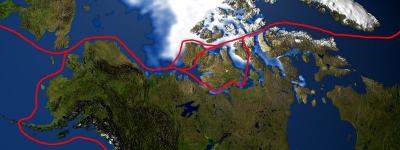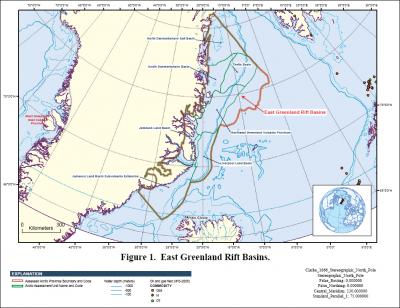We recently covered the shocking revelation that the Arctic sea ice was set to melt to an all time low this year (It will surpass predicted 2050 levels in fact). While this sounds to me like the IPCC has been woefully conservative in just how fast certain feedback mechanisms will warm the Arctic, it sounds to a lot of other people like the starting gun on a race for Arctic resources.
Sure we could be concerned about the deadly consequences of melting Arctic sea ice (thermohaline current disruption, destruction of the polar bear, melting permafrost, etc) caused by our rampant burning of fossil fuels. Or we could look on the bright side and see that really all that missing ice just makes it easier to dig up MORE oil and gas! (note: this is a demonstration of sarcasm)
The melting is already well underway, the fabled “northwest passage” Is becoming less “fabled” every day. In times past the main hindrance to this chilly ocean voyage was the ever present sea ice. As of the writing of this post the Northwest passage is nearly ice-free for the first time since records began.
“Since August 21 the North-West Passage is open to navigation. This is the first time that it happens,” Nalan Koc, head of the Norwegian Polar Institute’s climate change programme, told reporters in Longyearbyen, a town in the Arctic archipelago of Svalbard. (via)
The passage has been navigated before, Roald Amundsen did it in 1900, it only took him two years to pick his way through the ever shifting ice. Today you could sail through with nary a twitter from the crows nest of “iceberg ahoy!” Instead of passing new laws to halt global warming, the United States and Russia (and others) are instead looking for way to create new and lucrative ways to cash in.
But getting your made in China plastic crap to market faster is not the only benefit of melting arctic ice. Now that the miles of ice have melted there is a oil rush on. Russia famously planted its flag on the arctic flood several weeks ago.
Soon after Canada, Denmark, Norway, and the United States started making claims about this that or the other thing. The disputes are already starting, but Russia claims that the continental shelf extents from Siberia all the way to the north pole, meaning that any oil or gas found there belongs to Mother Russia.
The U.S. Geological Survey USGS released yesterday an assessment of undiscovered oil and gas resources in the East Greenland Rift Basins Province, suggesting that there may be a large amount to be discovered. Although there are no proven reserves in northeastern Greenland, significant undiscovered resource potential exists.
“This is the first systematic and comprehensive analysis of the undiscovered petroleum resources of the Circum-Arctic in the public domain,” said USGS Director Mark Myers. “Knowing the potential resources of the Arctic – an area of tremendous resource potential, environmental sensitivity, technological risk and geological uncertainty – is critical to our understanding of future energy supplies to the United States and the world.”
They claim that the Arctic has “great potential” meaning in non-government talk, “we want that fricken oil, and we want it bad” Because of this “great potential” of the Arctic, the USGS has undertaken a comprehensive assessment of the area in order to provide consistent and comparable geologically based estimates of the potential additions to world oil and gas reserves. Northeastern Greenland is the prototype for the USGS Circum-Arctic Resource Appraisal, and the USGS will be releasing assessments of all the Arctic provinces over the next year. Am I the only one that thinks drilling for oil and gas in the arctic is madness? I feel like I am taking crazy pills! Burning oil and gas is what got us into this problem in the first place and now we want to drill up more and burn it too? Sure continuing to burn fossil fuels might mean the melting of the polar ice caps causing a run-away warming streak resulting in the deaths of billions, but why split hairs.
The USGS estimates the mean undiscovered, conventional petroleum resources in the province to be approximately 31.4 billion barrels of oil equivalent of oil, gas, and natural gas liquids. (if it was all oil, it would be about 4 years worth of US consumption) In comparison to the world´s 500 other oil and gas provinces, if this resource is proved and realized, northeastern Greenland would rank 19th.
The area of study was approximately 500,000 square kilometers, most of which underlies less than 500 meters of water offshore of eastern Greenland. Most of the undiscovered oil, natural gas, and natural gas liquids are expected to be found in the offshore parts of the province.
New data made available for the current assessment significantly change the geological understanding of northeastern Greenland. In comparison to the 2000 USGS assessment of northeastern Greenland, this current assessment estimated significantly less total resource, more natural gas and natural gas liquids, and an increased ratio of gas to oil. These new geological data indicate that the burial and uplift history of the province and the source rock character are suggestive of significantly more gas generation than was previously interpreted.
The 2000 assessment estimated 47 billion barrels of oil BBO, 81 trillion cubic feet TCF of natural gas, and 4 billion barrels of natural gas liquids. Compared to the 2000 study, the new assessment estimated a smaller largest oil field 6.1 vs. 2.5 BBO but a larger largest gas field 7.1 vs. 18 TCF. Russia’s state owned gas giant Gazprom already has its eyes on other natural gas deposits in the Arctic. Want to do your own hunting for that sweet sweet carbon fuel, check out this interactive map (more info about the map).
It will be expensive, and dangerous to extract gas and oil from the Arctic. It will be dangerous and expensive to then use that gas and oil as fuel. It will be dangerous to continue with business as usual when it comes to letting our government manage our energy policy. The only responsible action would be to invest heavily in renewable energy sources and leave the Arctic hydrocarbons where they are.
The earth is very sick, and these oil and gas companies are simply trying to find a way to sell off the kidneys before she dies. Current renewable energy technologies are sufficient to supply a large amount of our energy needs, combined with efficiency standards and new technologies coming online, it will prove far cheaper to build wind farms, or solar power plants. Why waste billions of dollars drilling up oil and gas that will only make the problem worse, when we could be spending that money on solutions that will make the problem better? We must not let “business as usual” to rule the day. You can do your part by calling up your representatives and urging them to support renewable energy instead of carbon based fuel. Only when the senate is flooded daily with calls for renewable energy will anything get done.


As a Canadian who already gnashes his teeth over the destructive extraction of oil from the tar sands, I shudder at what oil finds and the NWP may mean to the Canadian Arctic.
Of course it’s a “good thing” – you don’t really think you are allowed to decide what “good” means, do you?
The definitions of “good” are clear, and set out in the lore of industrial civilization:
1) Anything that increases economic growth
2) Anything that pushes forward development (note : other terminology, such as “development” must not be misused, either)
3) Anything that increases material wealth amongst those in power
So who is going to be brave enough to redefine what “good” means?
Well I write fantasy novels so you can take my comment in due context.
That said, putting stresses on the world climate system is dangerous. We don’t know how far the climate will swing or how fast. But evidence indicates that Earth’s climate switches rapidly and often with catastrophic effect.
Rapid melt in sea ice means rapid melt in Greenland is soon to follow. Loss of even a small portion of that ice sheet will dramatically raise sea levels and, potentially, disrupt climate drivers like the Gulf Stream or other systems.
Even more worrying is geological evidence of catastrophic instances where ice damns form on melting glaciers and then suddenly break releasing massive amounts of water all at once. Past tsunamis flowing out of glaciers have cut huge swaths over land and sea. Some have even implicated these events in the extinction of megafauna at the end of the last geological era.
There’s one hell of a lot of water in the Greenland glacier. If temperatures rise, that water has to go somewhere. But progression in nature is hardly ever orderly or gradual. Things tend to happen suddenly and without warning.
This year, polar sea ice broke a new record minimum. It didn’t break the record, it shattered it. Previous minimum sea ice coverage for the northern hemisphere was 4.1 million square kilometers. Currently, the new minimum sits at 2.99 million square kilometers.
That’s 25% less ice than the least ever measured in the Arctic basin. The loss was sudden, unpredicted, and we don’t know what its impacts will be. Even more disturbing is the loss of one meter in elevation on the entire Greenland ice sheet.
If you want to take a look at what north pole sea ice stands today go to http://arctic.atmos.uiuc.edu/cryosphere/.
Let’s interject a little “real science” into the discussion. We don’t even know if polar ice melting is due to global warming. According to “real” calculations, the earth has been warming since 1998, it has cooled since that time, despite CO2 increases. The ocean temperature has also been found to have decreased in temperature, not increased.
How can the polar ice be melting then? How about a little common sense, and some real science that seems to be an “inconvenient truth”. A study by a KU engineer has observed thinning in the earth’s mantle and probable volcanic activity just below the infamous “ice river”. http://www.physorg.com/news116684418.html
While even he doesn’t have the balls enough to admit that volcanic activity is going to be a lot more efficient at melting ice than CO2, it’s incredibly odd that all that melting seems to be stemming from an area with increased volcanic activity, doesn’t it?